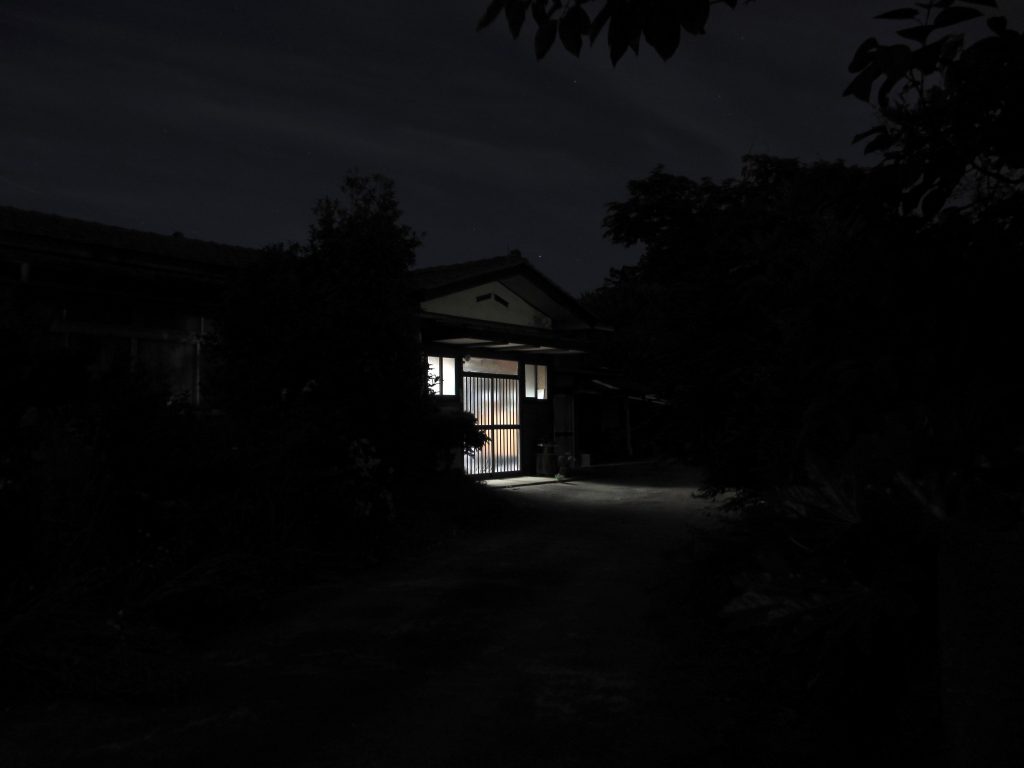This was originally written as a guest post for my good friend James at ALT Insider, and is re-posted here with his permission.

A while ago, Gaijin Pot ran a very honest and revealing article called Dealing With Depression In Japan, and while moving here may seem more like a holiday than real life, in fact – and for reasons I shall explain later – I would argue that you’re probably more likely to fall victim to mental illness while living abroad than in your home country. What follows, then, is an account of my own experience of depression, and while some of it relates directly to living in Japan and some of it doesn’t, either way, I thought that my story might be of interest to readers of Muzuhashi.
***
Until the spring of 2016 I was, on the face of it at least, enjoying life in my semi-rural corner of Ibaraki, working as an ALT and bringing up two young children with Mrs Muzuhashi, aka Mrs M. Then, all of a sudden, I was plunged into what I can state with some certainty were the worst twelve months of my life.
For the Muzuhashi family, 31st May 2016 was to be our last night in the ‘mansion’ – i.e. concrete apartment block – which had been our home for the previous four years. The next day, we were moving to a detached house that was slightly more expensive and slightly further away from civilisation, but significantly more spacious.
One of the students in my English class at the local community centre had told me about the property, and since it wasn’t listed with an estate agent, this was a classic case of my contacts in Japan paying dividends. Despite one or two drawbacks – for example, the commute to our children’s nursery school would now take thirty instead of ten minutes by car – it was too good an offer to refuse, and the kind of place in which Mrs M and I could envisage ourselves living for many years to come.
At the time, though, the move wasn’t the only thing on my mind. I was tired of being a middle school ALT, a job that was too easy and too boring, and in which I simultaneously felt superfluous to requirements, and on the rare occasions when I was asked to contribute to a JTE’s lessons, underappreciated. To that end – and following the advice of your main man James – for just over a year I had been doing translating and proofreading work on the side. Not least in the financial sense, I found this to be highly rewarding, but because I couldn’t do translating work at home, I was doing it instead in the school staff room, right under the noses of my teaching colleagues. In an effort to further improve my Japanese, I was due to sit level four of the Kanji Kentei (漢字検定 / a kanji test aimed at native speakers) at the end of June, and spent the remainder of my spare time on practice problems and past papers.
At home all was apparently well, but it has to be said that my social life had shrunk back to being practically non-existent, as I devoted almost every available moment outside work to my family. Having children was without doubt the most fulfilling thing I had ever done, and I progressed from being the kind of thirty-something bloke who is typically reluctant to start a family, to a hands-on dad and born-again baby hugger. My enthusiasm was, I now realise, all-consuming, and I had become a little too eager to sacrifice the kind of things that might have allowed me to let off steam, like going to a gaijin pub for an over-priced pint, channelling my inner Frank Sinatra at a karaoke box, or cycling off into the wilderness. As it happened, in the summer of 2016 the Muzuhashis were to embark on one of our occasional visits to the UK, and this gave rise to a whole new set of stresses. If, for example, we woke up on the morning of our flight to find that either Muzuhashi Junior or Muzuhashi Junior II was too ill to travel, we may have to cancel the entire trip, and because we couldn’t get insurance to cover such an eventuality, lose a quite eye-wateringly large amount of money in the process.
So having completed some last-minute preparations for the move, there was enough on my mind on 31st May that I was still awake at about midnight, when our daughter began to stir in her futon (like a lot of families in Japan, at the time the Muzuhashis were in the habit of all sleeping in the same room). When I say ‘stir’, what I really mean is ‘throw up’, and because there had been no sign of M Jr being ill that evening, my wife and I were unprepared for the veritable tsunami of vomit that engulfed M Jr’s face, hair, clothes, bedding, and even the floor.
About half an hour later the clothes and bedding were in the washing machine, and M Jr was showered and back in bed. By now, though, I was even more wide awake than before, and when, at around two a.m., she awoke for a further round of vomiting, poised to spring into action and limit the collateral damage.
After yet more mopping, changing and washing we were back in bed again, and this time M Jr went to sleep and stayed that way. Try as I might, however, I remained resolutely conscious. This was fine for another hour or so, but by three in the morning and then four, I began to contemplate the – as Al Gore might have put it – inconvenient truth that everyone else would wake up at six. I tried lying on my back, my front and on my side. I went for a pee, had a glass of milk, and listened as early morning commuters sped past on the road outside and scooter-borne newspapers were delivered to the neighbours.
For some reason, my mind had also become host to an unwanted intruder. A few bars from the chorus of one particular song – in this case, a J-pop number that was broadcast during cleaning time at the school where I worked – played over and over in my head, a phenomenon that is referred to as an ‘earworm’. Every time I turned over or adjusted my position on the pillow, every time I noticed a noise from outside, every time I had a new thought about how exhausted I might be the next day, every time I breathed, it seemed, the same phrase popped into my head, and try as I might I could not dislodge it from its needle-stuck-on-a-scratched-record, repeat-playback loop.
Finally, inevitably, the end came, and at six a.m. my wife and children woke up. Many was the time in my younger days that I would stay out all night, arrive home when the sun had already risen and sleep until lunchtime or later, and conversely, the earliest I had ever set my alarm to get up and go to work was 1.30 in the morning. But this was the first time in my life that I had quite literally not slept for a single second since getting into bed, and particularly on this occasion, there was no option but to get up and confront the day ahead.
Thankfully the move itself was taken care of by a combination of Mrs M, some friends of ours with a keitora (軽トラ / little white flatbed vans beloved of farmers and ubiquitous in the Japanese countryside), and a removals company. All I had to do, therefore, was go to work, zombie my way through a couple of English lessons with my JTE, and spend the remainder of the day sitting in the staff room, pretending to study kanji.
When I arrived at our new home that evening, the furniture and white goods were in place, and M Jr had been diagnosed with strep throat (溶連菌 / yohrenkin), throwing up several more times during the day. The crunch came that night, when the four of us retired together to our second-floor bedroom. Given the fact that by that point I had been awake for about forty hours straight, I assumed that I would drift off as soon as my head hit the pillow. But something had clicked in my brain the previous night, and once again I found myself tossing, turning, and looking on in envy at M Jr II: angelic, contented and fast asleep in the futon next to me.
I did eventually manage to get to sleep on the night of 1st June, but from that point onwards, each bedtime became a trial-by-insomnia, and while I didn’t have another all-nighter, on average I was getting no more than two or three hours’ sleep a night. Looking back, I’m amazed that I could still stand up straight, let alone ride a bicycle, drive a car, or explain the finer points of the present perfect tense to a room-full of fourteen year olds.
Perhaps inevitably, as well as physical tiredness and psychological stress, the insomnia soon took its toll on my immune system, and after more than a fortnight of next-to-no sleep, I fell ill on the day of the Kanji Kentei. The exam itself took place at four in the afternoon (members of staff are allowed to sit the Kanji Kentei alongside their students), and during the day I felt so dreadful that I contemplated going for a lie down in the nurse’s room. In the end I settled for dozing at my desk – which incidentally is a perfectly acceptable thing to do in Japan – but once I had sat the exam, gone home, not eaten dinner because my appetite had deserted me, taught the aforementioned community centre English class and returned home once more, I had a fever of 38 degrees (that’s 100°F for the more metrically challenged among you).
Even that night I hardly slept, and over the next few days went to see a doctor on three separate occasions. At one point my throat infection was so bad that I was on the verge of being admitted as an in-patient, but having twice been put on a drip and prescribed two different varieties of antibiotic, by the middle of the following week (with all of my paid holiday already allocated to our imminent trip to the UK, I was obliged to take two days off unpaid) things had finally started to improve.
The antibiotics also helped me sleep properly for the first time in nearly three weeks, but once I had finished taking them, while the throat infection had cleared up the insomnia had not, and on my last visit to the hospital I was handed a prescription for zolpidem, a sedative that is widely used to aid sleep. The doctor assured me that zolpidem was mild and would not cause any problems, but having taken my first dose at the end of June 2016, there began a year-long battle not just with insomnia, but with the medication I used to combat it, and with the side effects of both.
